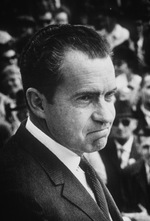Hillary Clinton has lost the Netroots primary, and with it, perhaps, the support of her party’s staunchest activists. (That’s Richard Nixon in 1967. Why in a moment.)
The evidence is mounting. Clinton is doing horribly in the monthly MyDD straw poll among its Netroots readers. Matt Stoller writes that she has "a DLC problem," in that she is using big money and establishment positions to try and steamroller her way to the nomination. Markos Moulitsas, the Kos of DailyKos, wrote yesterday that he can’t support her, because of her stand on Iraq.
How does this stack up against the Republicans’ analogous situation 40 years ago?
Let’s play the 1967 game and find out.
We’ll start with Richard Nixon’s position vis-a-vis movement conservatism, the closest analog to today’s Netroots. You’ll remember that Goldwater had been destroyed by Johnson in 1964 (the equivalent of Howard Dean winning his party’s nomination in 2004 and losing 60-40 to Bush) so the party’s 1966 comeback was tentative, led by AntiThesis politicians like George Romney (Mitt’s dad) and Charles Percy. Today’s Netroots are much closer to power. Many of their candidates won in 2006. It’s the DLC wing of the party that was blamed for the 2004 loss, which was narrow.
Ronald Reagan, who would ride the Nixon Thesis of Conflict to glory (conservatives never call their belief system Nixonism, only Reaganism) was in 1967 the newly-elected Governor of California, and even movement leaders like William F. Buckley were chary of him. Here’s a telling moment from a 1967 article which Buckley recently republished in his National Review. It’s a month after the 1966 election:
Richard Nixon was in the room. Who, someone asked, would the Republican
Party consider as eligible in 1968? Nixon gave the usual names — and
added Ronald Reagan’s. I objected. It strikes me, I said, as
inconceivable. "Why?" Nixon asked — "suppose he makes a very good
record as governor of California?" (This was in December, just after
Reagan’s election.) Because, I said, he is very simply an implausible
President.
In the past I have called Clinton’s situation analogous to that of Nixon, who came out of political exile to win the 1968 nomination. (This photo is an AP picture found on a Rolling Stone article making the same Clinton-Nixon analogies we’re making here.)
Nixon’s first task in 1967 was to bring the Republican regulars together, and in this he was extremely successful.
The equivalent to that wing now would be the DLC, which already supports Clinton.
Nixon’s success in winning Republican support was based on his hawkishness on Vietnam, as The New Republic noted in a story currently behind a paid firewall. By the time of the 1968 New Hampshire primary Nixon was able to crush Nelson Rockefeller, who was more dovish on Vietnam, winning 77% of the vote.
Blogger Famosity writes that Nixon’s ambitions were barely a blip on the political radar in the summer of 1967, but he was at that very moment out-maneuvering Rockefeller for Wall Street support. In this, Clinton is actually ahead of Nixon, because her work as Senator from New York has sewn up support it took Nixon 5 years to win.
The 1967 Nixon and today’s Hillary Clinton share similar advantages. Both are seen to be the smartest person in the room. Both have enormous institutional support. But Nixon was accepted by conservatives in 1967, in ways Clinton is not accepted by today’s Netroots.
The difference between the two lies in the war. The center of Nixon’s 1967 party demanded success in the Vietnam War, "peace with honor" in Nixon’s own phrase. The center of Clinton’s 2007 primary electorate demands a different strategy on Iraq and, increasingly, Republicans are moving toward this position.
Vietnam was a "Cold War activity." The heart of the 1960s’ crisis was cultural, and Vietnam was peripheral to that calculation. Iraq is a product of Cold War thinking, but the rejection of that thinking is at the heart of the current crisis, whose aim is to replace the struggle over oil with a struggle against oil, which is slowly strangling all of us on carbon dioxide.
Hillary Clinton is playing the right character but it’s a different play. The idea of "peace with honor" is only held by the falling Thesis. The new Thesis sees past this, wants Iraq over, and wants to prevent future Iraqs by getting us off hydrocarbons.
Clinton could still win through. She has an enormous financial advantage. But if the Netroots rally behind Obama rather than Edwards, he will enter the primary season even on money and technology.
It will be as if Nixon had faced Reagan in New Hampshire.











